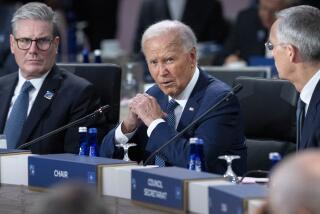Stomach Virus, Not True Flu, Believed to Be Bush Ailment
- Share via
WASHINGTON — Most people, at some point in their lives, will be stricken by the annual winter scourge known as the flu--and now it appears that President Bush has joined their ranks.
If, as the traveling White House says, Bush is suffering only a “touch” of the flu, he is among the rare lucky ones. A full-blown case of influenza typically brings full-blown misery: chills, fever, muscle aches and pains, headache, runny nose and extreme fatigue.
“It can be a very serious illness,” said Dr. John La Montagne, a flu expert with the National Institute of Allergy and Infectious Diseases. “Usually, when people get a case of the flu, they don’t feel like doing anything--they just go to bed.”
But true influenza--caused by two basic flu virus strains--rarely produces intestinal symptoms, experts said. More likely, Bush is suffering from one of several other common viruses that attack the gastrointestinal tract at this time of year and are often generically referred to as “stomach flu.”
“There is something that people call the stomach flu, but it is not caused by an influenza virus,” said La Montagne, who is the director of the national institute’s division of microbiology and infectious diseases. “In the public consciousness, if you’re sick in the wintertime, you have the flu--whether it’s stomach or respiratory.”
Bush’s gastrointestinal ailment is not believed to be related to his suffering from Graves’ disease, an overactive thyroid, which was diagnosed last spring and has since been treated successfully.
Most of the time, classic flu is not life-threatening, although it can prove risky in individuals 60 and older. Bush is 67. Even a flu shot--which Bush probably has had--is not fully protective against influenza viruses, which are constantly changing. Such shots do not protect against stomach viruses.
Flu is caused by two major strains of virus--influenza A and influenza B. But these strains undergo variations every year, which makes it impossible to develop a onetime vaccine that would confer permanent immunity from the disease.
This year, the predominant strain in the United States is a Type A variant known as H3N2, a designation that refers to proteins on the surface of the virus. Type A flu viruses are generally regarded as more serious than Type B strains.
A strain of Type A was responsible for the deadly 1918 pandemic that killed millions worldwide--many of them healthy young adults. “What happened in 1918 could happen again tomorrow,” La Montagne said.
Nevertheless, the President’s symptoms seem more consistent with a condition caused by one of a family of non-influenza viruses and is not regarded as dangerous, experts said.
“It is not life-threatening, not at all,” said Dr. Robert T. Schooley, head of the infectious diseases division at the University of Colorado Health Sciences Center. “It’s more of an inconvenience and nuisance than anything else.”
Whichever virus is producing Bush’s symptoms, his condition has almost certainly not been helped by jet lag--which compounds fatigue--his grueling schedule, and his propensity to engage in strenuous physical activity, such as tennis and running.
“You could be quite run down from a trip and that could make you more susceptible to some agents,” La Montagne said. “He may have overdone it.”
Unlike real flu, which can last for as long as two weeks, stomach viruses usually wreak havoc for 24 to 36 hours. But those can be very unpleasant hours--which Bush undoubtedly already has discovered--with nausea, vomiting, diarrhea and low-grade fever.
Lightheadedness, which Bush experienced when he slumped at the table during Wednesday night’s state dinner, is not uncommon.
The most serious danger from gastrointestinal virus attacks is dehydration, the result of fluids lost through vomiting and diarrhea, experts said. This is why the condition often is treated with lots of fluids to replenish what was lost. Significant dehydration can also cause lightheadedness.
Tigan, the anti-nausea drug given Bush by his physicians, is “a low-key medication with no major side effects,” Schooley said.
Also, it’s unlikely a connection exists between Bush’s symptoms Wednesday night and the controversial sleeping pill Halcion, which Bush had taken earlier to help combat the sleep-depriving effects of jet lag.
On the Menu
Here is the menu for Wednesday’s state banquet in Tokyo where President Bush collapsed:
Saumon Trais Morine a L’ Aneth au Caviar (Marinated raw salmon)
Consomme Chaud aux Champignons (Hot Consomme with mushrooms)
Tournedos Grille Sauce Poivrade (Fillet of Japanese beef)
Pomme Dauphins et Ligumes (Cooked potatoes and vegetables)
Salade de Saison (Seasonal salad)
Bombe de Passion a La Fraise (Passion fruit and ice cream with strawberry flavor)
More to Read
Sign up for Essential California
The most important California stories and recommendations in your inbox every morning.
You may occasionally receive promotional content from the Los Angeles Times.










